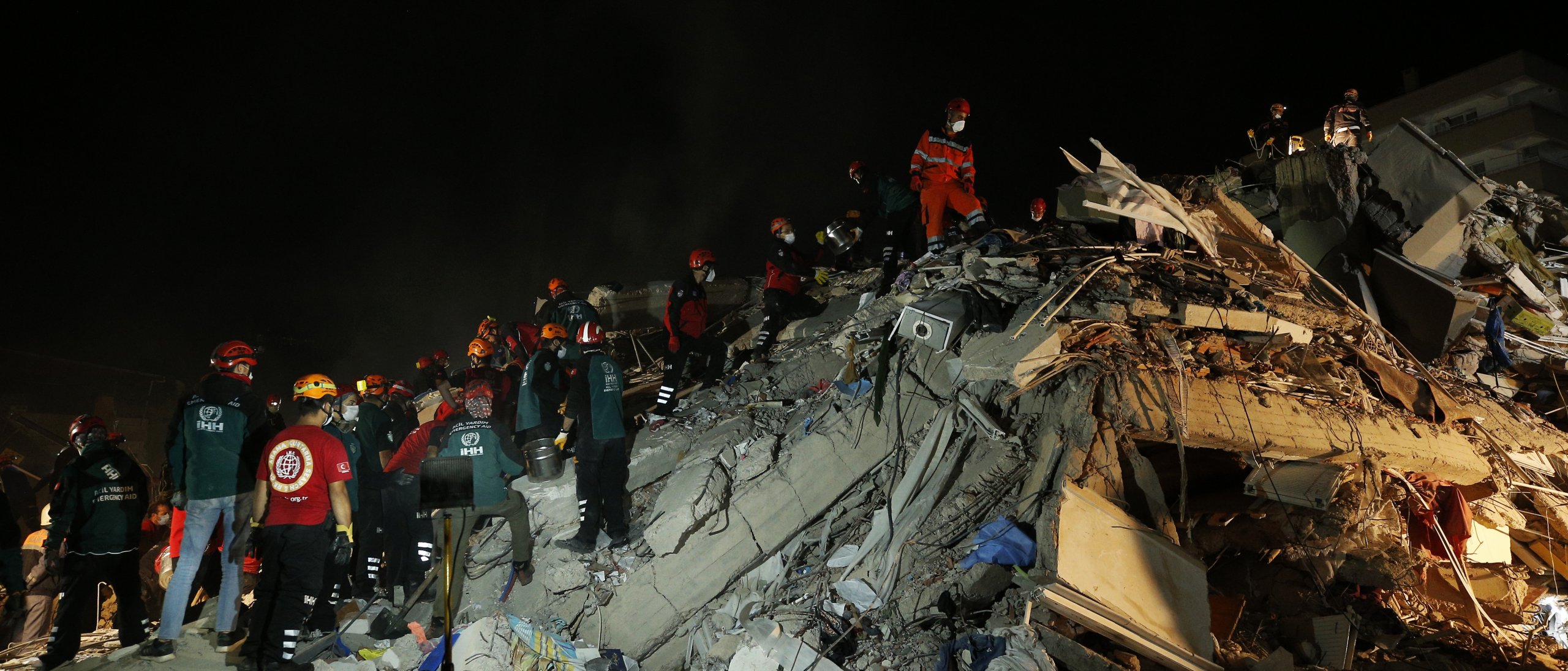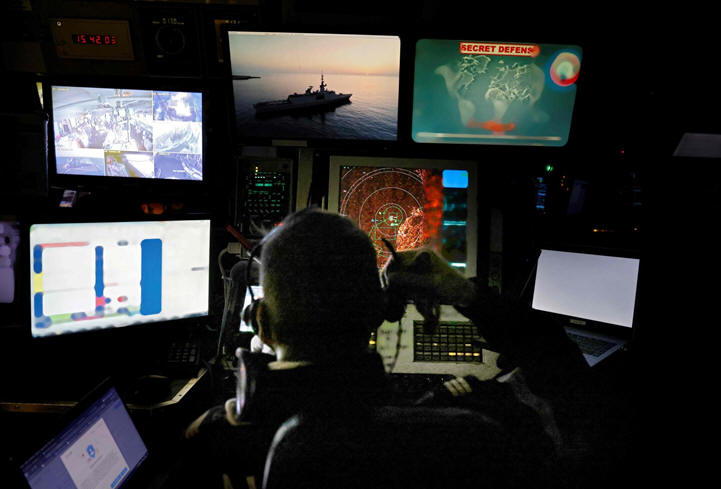www.aljazeerah.info
News, October 2020
Archives
Mission & Name
Conflict Terminology
Editorials
Gaza Holocaust
Gulf War
Isdood
Islam
News
News Photos
Opinion Editorials
US Foreign Policy (Dr. El-Najjar's Articles)
www.aljazeerah.info
|
Editorial Note: The following news reports are summaries from original sources. They may also include corrections of Arabic names and political terminology. Comments are in parentheses. |
28 Killed in 6.6 Magnitude Earthquake, in West Coast of Turkey, as French Frigate Closely Follows Turkish Research Vessels in East Med
October 31, 2020
 |
|
|
A building in Izmir destroyed by the earthquake of October 30,
2020 sabah |
 |
|
|
French Navy soldiers work at the tactical operation center on board of the French warship stealth frigate La Fayette, Oct. 26, 2020 Sabah, AFP |
28 killed in magnitude 6.6 quake on Turkey's west coast
BY DAILY SABAH WITH AGENCIES
ISTANBUL TURKEY
OCT 30, 2020, 2:58 PM GMT
A 6.6 magnitude earthquake struck off the coast of Seferihisar district in the western province of Izmir on Friday according to the Disaster and Emergency Management Authority (AFAD). The tremors occurred in the Aegean Sea at a depth of 16.5 kilometers (10.3 miles) but were felt across Turkeys third-largest city and as far away as Istanbul in the north.
Turkey's Health Minister Fahrettin Koca on Saturday said 28 people were killed and more than 800 others were injured. Crews were working to rescue survivors from the rubble of several buildings.
Speaking on Saturday, Environment and Urbanization Minister Murat Kurum said some 5,000 search and rescue personnel were working on the ground.
Kurum said 17 buildings collapsed in Izmir and rescue efforts were underway at eight of them. So far some 100 people were rescued.
Izmir Governor Yavuz Selim Köşger told reporters that four buildings were completely destroyed in the earthquake, and 70 were rescued from the rubble. He said one of the fatalities had drowned.
Professor Haluk Özener, head of the Boğaziçi University Kandilli Observatory Earthquake Research Institute, said at a press conference in Istanbul on Friday that there have been 19 aftershocks between the magnitudes of 3.3 and 4.8 since the earthquake, which lasted for more than 15 seconds. He also said a 30 to 40-kilometer fault line ruptured during the tremor.
The quake was strong enough to send people into the streets in panic in a country that has seen major earthquakes that killed thousands in the past. Three people were pulled out alive but injured from the rubble of a building in Izmir's Bayraklı district.
Shortly after the earthquake, President Recep Tayyip Erdoğan said all government institutes were mobilized to help the city.
We stand with all our citizens affected by the earthquake with all means possible. All our respective institutes and ministers have been mobilized, he said.
Television footage and videos circulating on social media showed people desperately removing the debris of some collapsed buildings to reach the people trapped under the rubble.
People in Izmir and neighboring provinces were warned by the AFAD to stay away from their homes if there was visible damage to the buildings.
Kandilli Observatory's Earthquake Research Institute also urged people to stay away from damaged buildings, warning that a secondary earthquake could cause more to collapse.
There could be secondary earthquakes of up to 5.8 magnitudes and a strong tremor could knock down already damaged buildings, Doğan Kalafat of the institute told broadcaster CNN Türk.
Footage from the region also showed a small-scale tsunami, particularly powerful in the coastal town of Sığacık in Seferihisar.
The quake was also felt across the eastern Greek islands and even in the Greek capital Athens. A boy and a girl were confirmed dead after being found unconscious in an area where a wall had collapsed near Vathy, a town on the island of Samos.
Greek media said the residents of Samos and other islands fled their homes, while some rockfalls were reported. It was also felt in Bulgaria. Greek seismologist Efthymios Lekkas told Greek state television ERT that it was still too early to say whether this was the main earthquake, although he said it was likely it was. "It is an event that is evolving," Lekkas said, adding that some damage had been reported in parts of Samos. A tsunami warning was issued, with residents of the Samos area told to stay away from the coastline. Seawater rose above the dock in the main harbor of Samos and flooded the street. The regional governor of the Samos region, Yiannis Stamoulis, said no injuries had been reported on the island. Residents have also been told to stay away from buildings, as aftershocks continued to rattle the area.
The last major earthquake to hit Izmir was in October 2005, with an epicenter near Seferihisar. Three earthquakes between the magnitudes of 5.7 and 5.9 over four days rocked the city and nearby Aydın then, without major damage, while two people died of a heart attack.
Experts say the Aegean region often generates earthquakes but usually at sea. The seabed and land are densely dotted with fault lines. They expect more aftershocks and smaller earthquakes as the cracks in fault lines are anticipated to linger, though their magnitude will diminish over time.
Turkey is among the world's most seismically active zones as it is situated on several active fault lines, with the most potentially devastating being the Northern Anatolia Fault (NAF), the meeting point of the Anatolian and Eurasian tectonic plates. It has suffered devastating earthquakes in the past, including the 7.4-magnitude earthquake in Gölcük in 1999. It killed more than 17,000 people in the greater region. The last major earthquake was in January, with a magnitude of 6.7. It killed 41 people in the eastern provinces of Elazığ and Malatya and injured 1,607 others.
***
French frigate closely follows Turkish research vessels' activities in East Med
BY DAILY SABAH WITH AFP
ISTANBUL DIPLOMACY
OCT 30, 2020 2:25 PM GMT
A French frigate cruising the tense Eastern Mediterranean waters has been closely following the activities of Turkeys seismic research vessels, which have been conducting gas exploration activities in the region, recent footage has revealed.
The recent footage of the French frigate La Fayette released by Agence France-Presse (AFP) shows that a dozen officials working in the vessel scan radar screens through the dark. Among the red squares showing the positions of vessels at sea, two Turkish exploration ships stand out, the Oruç Reis and Barbaros.
France has since August deployed more assets in the Eastern Mediterranean, amid the escalating tensions between NATO members Turkey and Greece over conflicting claims to hydrocarbon resources in the Eastern Mediterranean and overlapping views on the extent of their continental shelves.
Ankara accuses Athens of pursuing maximalist policies in the Eastern Mediterranean and underlines that its maritime claims constituted a violation of Turkey's sovereign rights. Ankara has also said energy resources near the island of Cyprus must be shared fairly between the Turkish Republic of Northern Cyprus (TRNC) and the Greek Cypriot administration.
NATO has set up a hotline to help the Greek and Turkish militaries avoid accidental clashes and Germany has been leading a diplomatic outreach.
But Greece and the Greek Cypriot administration, with strong backing from France, have been calling for tougher action. The EU leaders are due to return to the issue at their next summit.
With President Emmanuel Macron pledging "non-negotiable solidarity" for Greece and the Greek Cypriot administration, La Fayette took part in August maneuvers with Greece and the Greek Cypriot administration to show a united European front against Ankara.
"Our primary mission is to observe everything that happens, to offer our chiefs and the political authorities our own understanding of the situation," said the ship's group operations leader, Lieutenant Mathieu.
The screens pick up a British warship in Limassol, the Greek Cyprus, Russians off the Syrian coast and Turkey's Oruç Reis on a disputed energy exploration mission between the Greek islands of Kastellorizo and Rhodes, overriding protests from Athens.
There's also Turkey's Barbaros, carrying out seismic explorations southwest of the island of Cyprus, escorted by two civilian vessels to protect its huge cables fitted with underwater microphones.
"They've lightened their presence these last weeks. We are checking that it won't increase again at one stage or another," said Captain Sebastien Martinot, the ship's commander.
On such a mission, "we shed a light on a zone where more than ever we need clear facts to be able to make judgments, avoid mistakes and not rely on rumor, social networks, or even the information from our allies," he stressed.
During three months at sea, "We have never monitored the Turks as much", said leading rate Lies, stood on the sun-splashed bridge looking out over the Lebanese coast.
"We have come across them so many times we know which ships are protecting them. But we do not intervene, that's not our role."
All information gathered daily is sent to the French command of the Mediterranean military zone (CECMED) in Toulon. It is also shared with the international operation Inherent Resolve for Iraq and Syria as well as Europe's Irini set-up to enforce a U.N. arms embargo on Libya.
However, the data is not shared as systematically with NATO, of which Turkey is a member, the captain admitted.
In summer, Paris temporarily withdrew from the NATO maritime security operation "Sea Guardian" in the Mediterranean, after condemning "extremely aggressive" behavior by a Turkish warship against a French vessel during an attempt to check a cargo ship suspected of carrying arms to Libya. Ankara denied Paris' claims and demanded an official apology.
***
Share the link of this article with your facebook friendsFair Use Notice
This site contains copyrighted material the
use of which has not always been specifically authorized by the copyright
owner. We are making such material available in our efforts to advance
understanding of environmental, political, human rights, economic,
democracy, scientific, and social justice issues, etc. We believe this
constitutes a 'fair use' of any such copyrighted material as provided for
in section 107 of the US Copyright Law. In accordance with Title 17 U.S.C.
Section 107, the material on this site is
distributed without profit to those
who have expressed a prior interest in receiving the included information
for research and educational purposes. For more information go to: http://www.law.cornell.edu/uscode/17/107.shtml.
If you wish to use copyrighted material from this site for purposes of
your own that go beyond 'fair use', you must obtain permission from the
copyright owner.
|
|
|
|
||
|
||||||


